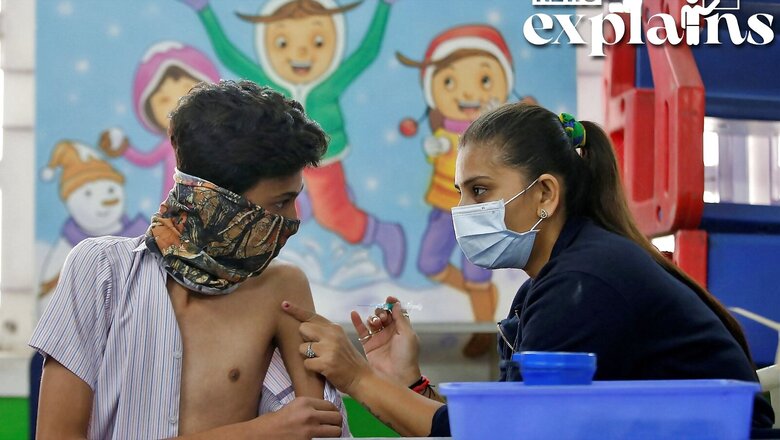
views
Union Health Minister Mansukh Mandaviya met with representatives of the Indian Medical Association (IMA) and other top doctors and public health experts on Monday to discuss Covid-19, and was urged to allow people to take their second coronavirus booster doses, reports said.
Dr. JA Jayalal, former president of the Indian Medical Association (IMA), who attended Monday’s meeting with the health minister, stated that the government was urged to consider a fourth dose for the population, particularly healthcare workers and frontline workers, the Hindustan Times reported.
“The last dose for healthcare and frontline workers started nearly a year ago. Such a long gap would wane off immunity. We have urged the minister to consider a fourth precautionary dose for people, especially doctors, nurses, other hospital staff and frontline workers who have to manage patients and are at higher risk,” Dr Jayalal was quoted as saying by the publication.
Amid the demand, let’s look at the case for a fourth dose or a second booster.
First, What is a Booster?
When it comes to getting vaccinated against a disease like COVID-19, booster shots can be a standard part of the procedure.
The term “booster” refers to an additional dose of a vaccine given after the initial (or primary) dose. According to Sandy Salverson, PharmD, vice president of Pharmacy Operations at OSF HealthCare, these boosters can occur weeks, months, or years later.
“Most adults recall having to get a booster shot for a childhood disease like measles, whooping cough, or meningitis. Or for a disease like tetanus, where booster shots are recommended every ten years as the original immunity deteriorates,” Sandy explained.
HOW DOES THIS HELP?
Some vaccines are administered with the original (or primary) dose followed by a booster dose. The original dose primes the immune system to recognise and produce antibodies against the virus against which it was designed to defend.
Booster shots are given to the body’s immune system to remind it of the virus it needs to defend against. This strengthens or boosts the immune system.
Covid boosters are also said to be extremely helpful for risk groups – the elderly or those with immunity compromising diseases.
So, What is a Second Booster?
A second booster is simply a fourth dose of the vaccine, given to prevent waning of immunity after some time period has passed past the third dose.
Does It Help?
While speaking to India Today, Dr Randeep Guleria, the former director of AIIMS, stressed the need to only take the third dose and said that there is “no data that suggests a fourth dose is needed”.
Dr Rajeev Jayadevan, who is a member of the COVID Task Force told the news outlet that the problem with booster doses is “their effectiveness is short-lived,” adding that the two messenger RNA (mRNA) vaccines that have been used as a fourth dose in other countries show that the “effect wanes rather quickly than the third dose”.
Several health experts have also emphasised the importance of booster doses only for the most vulnerable people. Professor K Srinath Reddy, founder (Past) president and Distinguished Professor of Public Health (PHFI) has said that it is not necessary to boost everyone, “except those who have weak immunological defences”.
The World Health Organization (WHO) has not issued an official recommendation for a fourth dose, and “there isn’t any good evidence at this point in time” that it will be beneficial, according to WHO chief scientist Soumya Swaminathan, who spoke with CNBC in May.
“What we know from immunology is that if you give another booster, you will see a temporary increase in the neutralising antibodies. “However, we’ve also seen that these neutralising antibodies fade quickly,” she added.
Which Countries Give the Fourth Dose?
Israel was one of the first countries to approve the fourth dose for its people, making it available as early as December 2021, a report by Firstpost explains.
The fourth dose has been recommended by the Centers for Disease Control and Prevention in the United States for people aged 50 and up. Countries in Europe such as the United Kingdom, Sweden, and Denmark are providing the fourth vaccination to vulnerable groups. It is given to anyone who requests it after consulting with a doctor in Hungary.
Cambodia is administering the vaccine to high-risk groups in Asia. They previously used Chinese vaccines, which were reported to be less effective. Thailand’s fourth dose is intended for residents of tourism-dependent areas such as Bangkok, Krabi, and Phuket. The jab is available in South Korea to those with compromised immunity, primarily those living in nursing homes and care facilities.
Until now, 54 countries have not implemented booster doses and have only provided primary vaccination, whereas at least 59 countries have implemented one booster dose and 80 countries have implemented a second booster dose, a report by Times of India states.
Canada, Brazil, Pakistan, and the United States are among the countries that have started two booster doses.
According to data, some countries have a high number of booster doses per 100 people. Among the countries on the list are Argentina (72), Australia (75), Austria (75), Canada (77), Cuba (77), England (119), Germany (77), Peru (82), Singapore (78), and Taiwan (98), the report explains.
Read all the Latest Explainers here


















Comments
0 comment